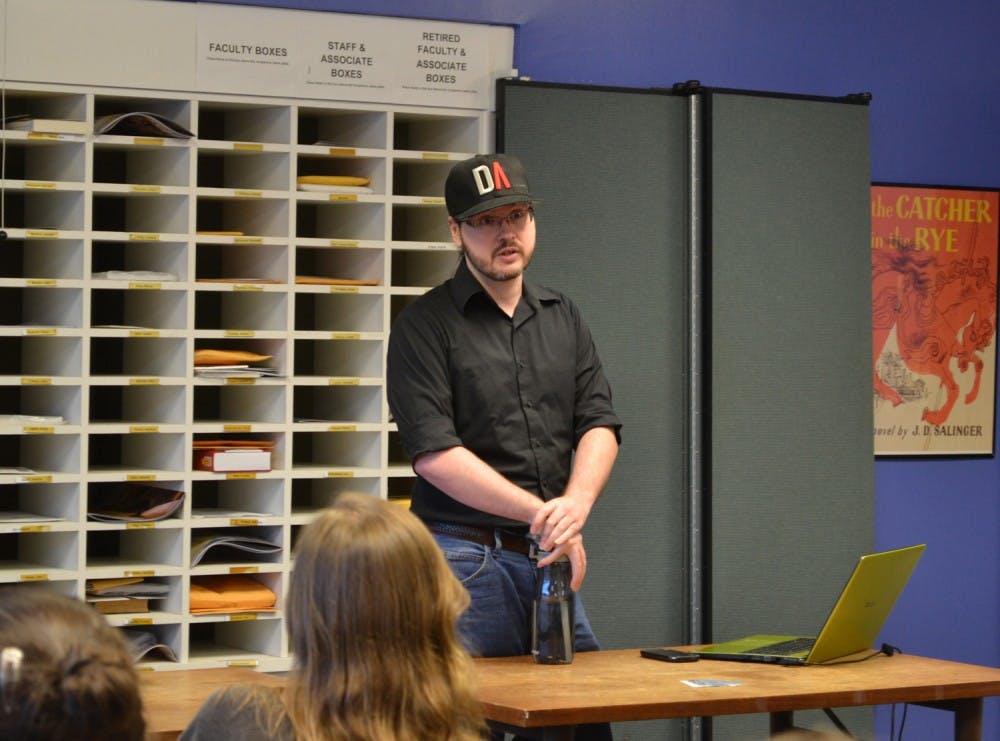Gabriel Flood — a self-described “writer, storyteller [and] cancer survivor” — gave a talk to the English Students Association Monday on the topic of intersection of cancer, humor and mental illness.
According to Selina Horsley, fourth-year Curry student and president of the English Students Association, there were originally meant to be separate talks with the Virginia Journal of Bioethics, the English Student Association, Universities Allied for Essential Medicines and To Write Love On Her Arms at U.Va. The groups eventually decided to co-sponsor a single event focusing on various aspects of his story. Horsley had high expectations for the talk, realizing Flood was a gifted public speaker when she first met him.
“I could tell he’s going to be a good public speaker because the way he tells stories is so charismatic, and it really gets you listening to the story in a way that makes you excited to hear what he has to say,” Horsley said.
Flood began by joking that he was there to talk about puppies, then quickly deadpanned “Just kidding guys — it’s cancer.” He emphasized everyone’s journey with cancer is unique, and that his particular journey was as straightforward as it could have possibly been, while simultaneously upending his world and outlook on life.
Flood began the story talking humorously about April 2013, when he first noticed something was wrong.
“April 2013 — my life was in the toilet,” Flood said. “And I want you to have a clear vision of this. Because what might've popped into your head might've been your toilet — but your toilet is cleaner than the toilet that my life was in. I'm talking like subway public restroom with like the chart above the wall, name of the last guy who cleaned it and the date that’s like 2010 … that's the toilet my life was in at the time.”
It was amidst months of unemployment that Flood first noticed a large lump in his neck, and upon conferring with WebMD, realized there was a distinct possibility that he had cancer. He waited, hoping it was nothing, but he began feeling worse and noticed dark veins in his chest, which prompted him to see a doctor. Without insurance, the only doctor he could see was at a 24-hour urgent care center, who told Flood he had an allergic reaction and needed an anti-inflammatory cream.
Talking about his experience, Flood realized he could now see specific turns in his journey that ended up saving his life. His decision not to accept an easy diagnosis when he knew something was deeply wrong was one of those turns. After seeing another physician, he was told to go immediately to an emergency room, and on a whim, he decided to go to Augusta Medical Center rather than the local Harrisonburg hospital nearby. Though Flood did not know it at the time, Augusta Medical Center had a new cancer center headed by a decorated doctor from the Mayo Clinic, which may have helped his recovery.
According to Flood, waiting in the emergency room that day was the first moment he began to regain his agency. His parents and best friend were there, and he noticed the room filling with tension, so he started telling jokes — and the tension melted away, making him feel better.
It was there that Flood received what he called his first “mortality shock” — a moment where he realized he had a distinct chance of dying.
“How you react to the mortality shock changes you, but you get to choose whether it takes your agency,” Flood said. “Where I was able to retain my agency I did instinctively.”
According to Flood, this shock was the catalyst for him to regain direction in his life through positivity, humor and writing. He began to consciously joke with nurses before chemotherapy treatments, and the nurses reflected that positivity back.
“I seized on the only power that I had, and that was — if these people have the power to give me a varying quality of care based on their day, their mood, their life — how do I tweak the odds in my favor?” Flood said. “And there I found power where powerlessness lives — I found that when they smile — when they see me — I feel better.”
Flood began writing and injecting that same positivity into blog posts, and people wrote back wishing him well and telling him they related to his story. He notes it wasn’t what he was writing about — cancer — but the way he wrote about it. He realized that his words had power.
“Cancer didn’t give me a lot,” Flood said. “But it did give me purpose where I had lacked it before.”







